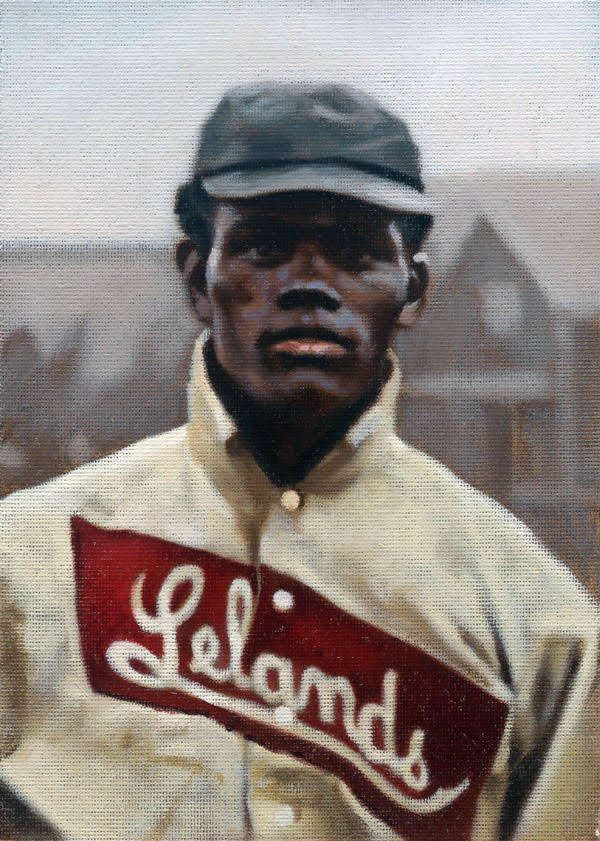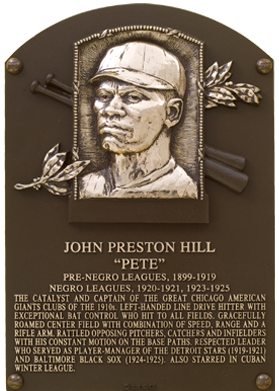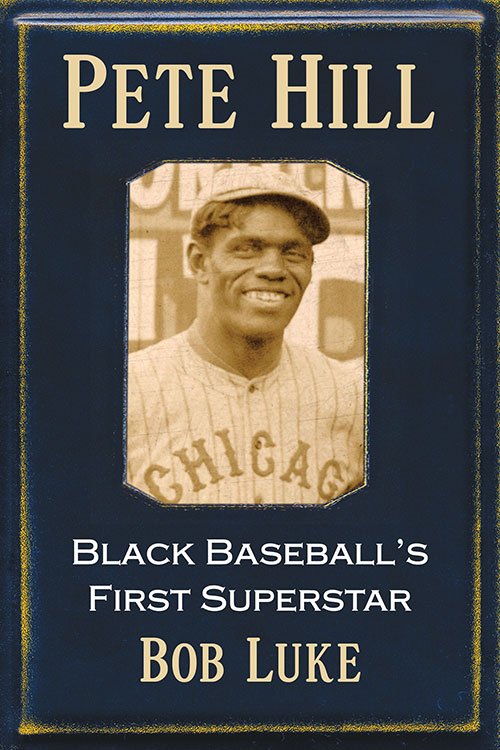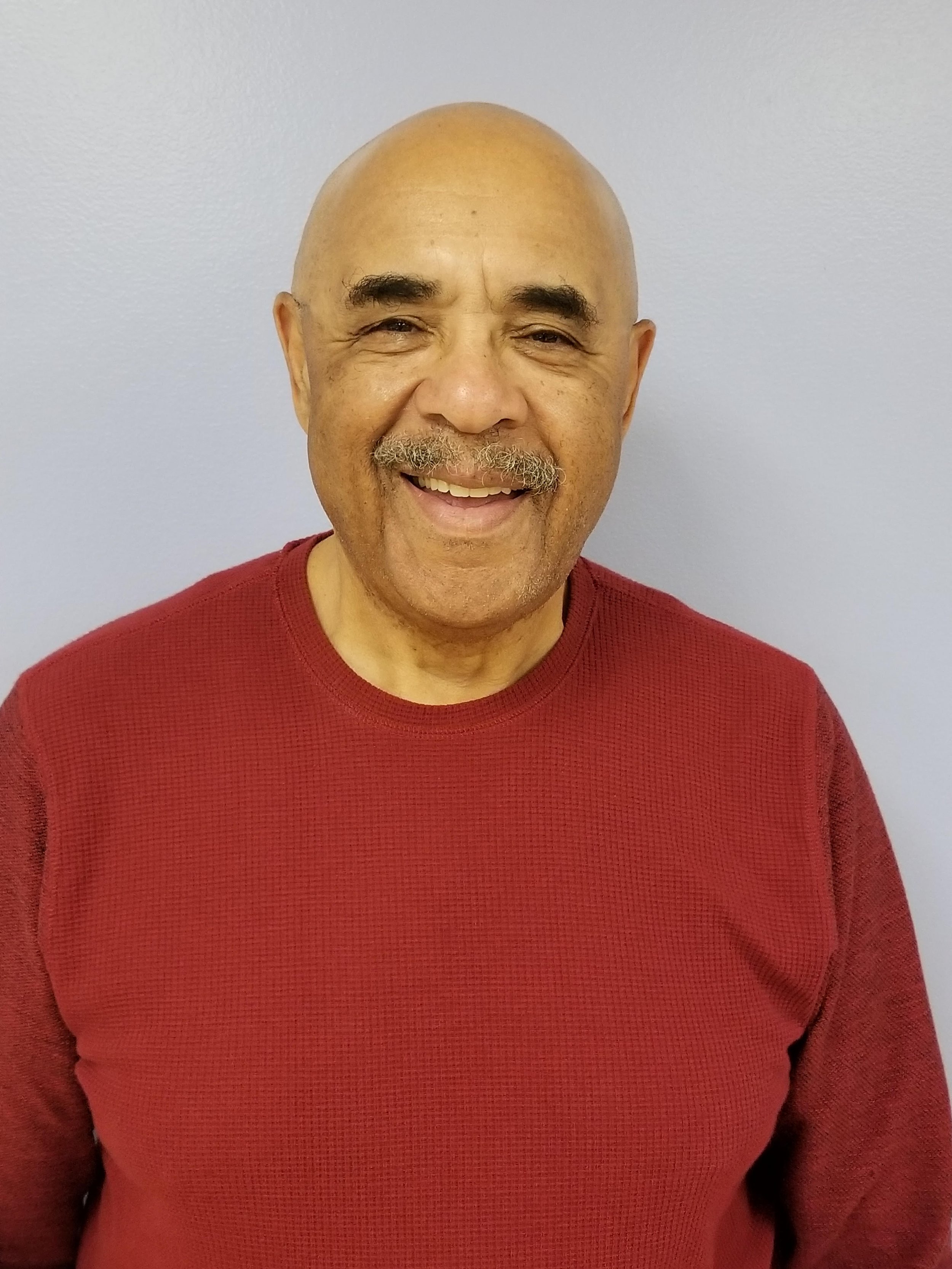John “Preston” Pete Hill
John Preston “Pete” Hill was a baseball outfielder and manager for the Negro Leagues from 1920 to 1925. Hill was born on October 12, 1882 in Culpeper County, Virginia to Ruben W. Hill and Elizabeth “Lizzle” Seale Hill. He also had two older brothers, Jerome Hill and Walter Hill. Hill’s father disappeared when he was still a child and the family suspected that he died in 1887. The Hill family later relocated to Pittsburgh, Pennsylvania.
Hill started playing professional baseball at the age of 17 in 1899 with the Pittsburgh Keystones in Pittsburgh, Pennsylvania. This was one of the many all-black teams that existed before the first Negro Baseball League was founded in 1920. Hill remained with the team for two years until he joined the Cuban X-Giants and played with them from 1901 to 1902.
In 1904, Hill signed with the Philadelphia Giants owned by newspaperman H. Walter Schlichter and managed by Sol White. Hill played left field and batted in the bottom third of the order. He eventually took center field and batted third, fourth, and fifth in the rotation. Hill played with the Philadelphia Giants from 1904 to 1907. Also, he played for other clubs including Cuban Baseball League teams Club Fe (1906-1907) and Habana (1907-1912). Hill returned to United States baseball when he signed with Brooklyn Royal Giants and played from 1908 to 1909 and the Chicago American Giants (1911-1918) when these teams were independent before the Negro Leagues in 1920. The Detroit Stars, (1919-1921), the Milwaukee Bears (1923), and Baltimore Black Sox (1924-1925) as the Negro Leagues was established in the 1920’s.
Hill retired from professional baseball in 1925 at the age of 43. He spent the rest of his life in Buffalo, New York where he worked as a porter on the Delaware, Lackawanna, and Western Railroad. Hill married Gertrude Lawson either in 1906 to 1907. The couple had a son born in 1910 named Kenneth Hill.
John Preston “Pete” Hill died on December 14, 1951 from coronary thrombosis in Buffalo, New York. He was buried in the Holy Scpulchre Cemetery in Alsop, Illinois. In 1952, the leading African American weekly newspaper, the Pittsburgh Courier, named Hill the fourth-best outfielder in Negro League history behind Oscar Charleston, Monte Irvin, and Cristobal Torriente. In 2006, Hill was introduced into the Baseball Hall of Fame. In July 2011, a plaque of Hill was introduced at a ceremony on October 12, 2010 where his relatives and friends attended.
Source: blackpast.org
Additional Information:
Among early 20th century baseball players, John Preston “Pete” Hill (1882–1951) was considered the equal of Babe Ruth, Ty Cobb and Tris Speaker—only skin color kept him out of the majors. A capable manager, Hill captained the Negro League’s Chicago-based American Giants, led two expansion teams and retired from the sport as manager of the Baltimore Black Sox. Drawing on contemporary newspaper accounts, this first ever biography of Hill recounts the career of a neglected Hall of Famer in the context of the turbulent issues that surrounded him—segregation, women’s suffrage, Prohibition and the Spanish flu.
Providing a comprehensive history of the Baltimore Black Sox from before the team's founding in 1913 through its demise in 1936, this history examines the social and cultural forces that gave birth to the club and informed its development. The author describes aspects of Baltimore's history in the first decades of the 20th century, details the team's year-by-year performance, explores front-office and management dynamics and traces the shaping of the Negro Leagues. The history of the Black Sox's home ballparks and of the people who worked for the team both on and off the field are included.
Family Member
Ron Hill
Great Nephew of John “Preston” Pete Hill
Founder and President of The John Preston “Pete” Hill Foundation, Ronald Hill is the great nephew of Baseball Hall of Famer and Negro Leagues player, John Preston (Pete) Hill. Born in 1946 and growing up in the Homewood neighborhood of Pittsburgh, PA, Ron often heard through his older relatives that there was a great baseball player in his family. Little did Ron know that he would live through some of his Uncle Pete’s struggles to find an equal place in society to excel and advocate for his civil rights. Although Ron’s sport of choice was football from an early age, it was this opportunity to be part of a team working towards the goal of victory that cemented much of his path in life.
Ron went on to Westinghouse High School where he became a standout on the football field striving for and achieving championship. Through The Pete Hill Foundation, Ron and the foundation members want to ensure the same opportunities - to be part of a team and strive for victory - to inner city youth through participation in not just baseball, but in life.
In his early twenties (1968), Ron attended Tuskegee University. Again, Ron soon found his place on the football team and soared toward victory.
Leaving Tuskegee in 1969, Ron joined The United States Marines. Ron knew that it had only been about 30 years for African Americans to be part of the Marines. “From its inception until 1941, the Marine Corps refused to recruit African Americans and other minorities.” https://www.barracks.marines.mil/News/News-Article-Display/Article/498218/the-history-of-the-black-marine/
Yet even in the late 60s and early 70s, Ron quickly realized that African Americans still were not treated equally as other members of the corps. Looking back on this, Ron could relate to the experiences of his Great Uncle Pete. “The color line, also known as the color barrier, in American baseball excluded players of black African descent from Major League Baseball and its affiliated Minor Leagues until 1947.” https://baseball.fandom.com/wiki/Baseball_color_line. Ron persevered leaving the service with an honorable discharge.
Learning about the details of his Great Uncle Pete Hill’s accomplishments, Ron recognized two characteristics he shared with his great uncle – determination and commitment – both of which led to much success in Ron’s own life.
After the military, Ron enrolled in the University of Pittsburgh.
In the early 1980s Ron worked for DiCesare Engler Productions managing security and promotions for music venues. Ron worked with many black entertainers including the likes of Earth Wind and Fire and Smokey Robinson. Still, Ron noticed even then in the 1980s, the preconceived notion of much of the public was that trouble was coming when the performers were African Americans. Ron made it his mission to keep things running smoothly and to prove them wrong.
He went on to work for Sylvia Robinson as the Road Manager for The Sugarhill Gang. Eventually, Ron chose to leave touring and management and return to Pittsburgh.
He worked at the Allegheny County Jail for over 20 years rising from Correction Officer to the position of Major until his retirement.
Ron’s work was not done. Just as Pete Hill continued in the business and management of baseball after his retirement from the Negro Leagues, Ron stayed active working security for the University of Pittsburgh and supervising locker room and hotel security for several Super Bowl games.
With a move to Los Angeles, Ron grabbed the opportunity to guide and mentor youth at Los Angeles High School and GALA: Girls Academic Leadership Academy.
Most recently, Ron purchased a home in Frederick, MD to be near his son and granddaughters. Here he continues his work with youth volunteering as a mentor in the I Believe in Me program whose mission is youth empowerment and development.
It is Ron’s hope that The Pete Hill Foundation will provide opportunities for youth to excel in the sport of baseball. In an article by Christina Gough, she explains, “In 2022, only 7.2 percent of MLB players were African American.” https://www.statista.com/statistics/1168026/mlb-african-american-players/
Ron wants African American inner city youth facing challenges to learn a lesson from his Great Uncle Pete Hill. As quoted from an article in the New Pittsburgh Courier in 2010, Ron says, “They went where the work was where they could get an education. It’s those kinds of characteristics, perseverance and resilience that were instilled in Pete and his siblings. Children today should be able to go out there and do anything.”








